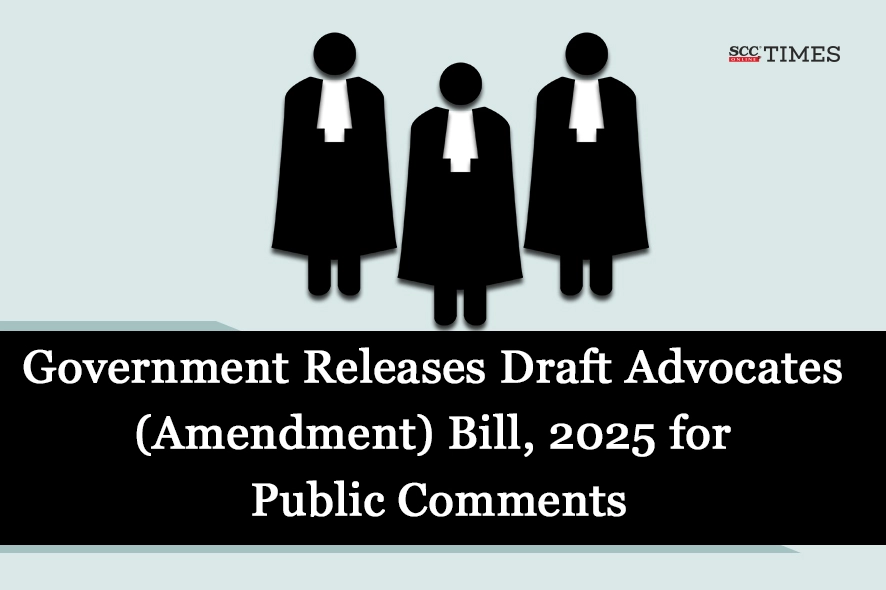The Department of Legal Affairs has unveiled the Advocates (Amendment) Bill, 2025, proposing significant changes to the Advocates Act, 1961. The draft released for public consultation aims to bring the Indian legal profession in line with contemporary global standards, enhance transparency, and introduce stricter regulatory mechanisms.
Public comments are invited until February 28, 2025.
Key Highlights of the Proposed Amendments:
1. Expansion of Legal Practitioner Definition
The Bill proposes to broaden the definition of “legal practitioner” (Section 2) to include not just advocates practicing in courts but also corporate lawyers, in-house counsels, and those engaged in legal work in private and public organizations, statutory bodies, and foreign law firms.
2. Mandatory Bar Association Registration
A new Section 33A mandates that all advocates practicing before courts, tribunals, or authorities must register with a Bar Association where they primarily practice. In case of a change in location or field of law, the advocate must notify the previous Bar Association within 30 days. Advocates will be allowed to vote in only one Bar Association.
3. Ban on Court Boycotts and Strikes
A significant inclusion is Section 35A, which prohibits advocates and Bar Associations from calling for or participating in strikes or boycotts of court proceedings. Any violation will be deemed professional misconduct, attracting disciplinary action. However, symbolic or one-day protests on professional or administrative issues are permitted, provided they do not disrupt court work.
4. Government Oversight and Regulation
-
Government-Nominated Members in BCI: Section 4 of the Act is proposed to be amended to allow the Central Government to nominate up to three members to the Bar Council of India (BCI), in addition to the existing elected members.
-
Power to Issue Directions: The Bill introduces Section 49B, granting the Central Government the authority to direct the BCI in implementing provisions of the Act and its regulations.
5. Stricter Disciplinary Measures & Misconduct Liabilities
-
Enhanced Penalty for Unauthorized Practice: Under Section 45, those practicing law without proper authorization could face imprisonment up to one year (earlier six months) and/or a fine up to ₹2 lakh.
-
Liability for Advocate Misconduct (Section 45B): If a person suffers a loss due to an advocate’s misconduct, they can file a complaint under the regulations prescribed by the BCI to determine liability.
-
Removal from State Roll (Section 24B): Advocates convicted of offences with imprisonment of three years or more will be removed from the State Bar Council’s roll. Re-enrollment may be considered two years after release, subject to BCI approval.
6. Verification and Professional Oversight
-
Mandatory Certificate & Place of Practice Verification: The Bill proposes periodic verification of advocates’ credentials, including degrees, addresses, and workplaces.
-
Foreign Law Firms & Practitioners: The entry of foreign law firms and lawyers into India will be regulated through rules framed by the Central Government.
7. Legal Education & Professional Training
-
The BCI will oversee the recognition and regulation of law firms and introduce mandatory pre- and post-enrollment training for law graduates.
-
Bar Examination (Section 2): The Bill reinforces the requirement for clearing the All-India Bar Examination or other prescribed tests before full practice rights are granted.
9. Verification of Advocates’ Credentials (New Section 19A & 7(da))
-
Advocates must undergo periodic verification of their degrees, credentials, and place of practice every five years.
-
Fake or forged degrees will lead to disqualification.
10. Women Representation in Bar Council of India
To promote diversity, the bill mandates at least two women members in the BCI, co-opted from eminent female advocates. This is a significant step towards greater gender representation in legal institutions.
Public Consultation and Next Steps
The Ministry of Law and Justice has urged stakeholders, including advocates, law students, and the general public, to submit their comments and feedback via email to dhruvakumar.1973@gov.in and impcell-dla@nic.in by 28-02-2025.
As the debate unfolds, legal professionals and the public have a vital opportunity to shape the future of the legal profession through constructive feedback on the proposed amendments.







there should be reservation for women, sc/st/obc in the Bar Councile
If police officer registered fake FIR on advocates tb to Advocates gye nd Central Government apne hi aadmi ko BAR me laenge to isme transparency kha rhi ?
#Boycottadvocateprotectionact2025
Fast proceedings are required and 14000+judges are required for 140 Cr Indian 🙏🙏
Central government is to establish draft committee for preparation of code of conduct bill for elected representatives. This is just and essential for existence of real democracy
Code of conduct bill is to be introduced to elected peoples representative .because they take salaries and pension whereas advocates never take any salary or pension Central ave is to establish draft committee for drafting code of conduct bill for people representatives
There is need of discussion in respect of advocates amendament bill ?
Whether such type of similar bill to be introduced with other professionals just like engineers or doctors .?
अधिवक्ता सुरक्षा अधिनियम को भी लाया जाए जिसे अधिवक्ताओं के हित सुरक्षित हूं
जूनियर अधिवक्ताओं को आर्थिक रूप से बार काउंसिल को मदद की जानी चाहिए जो कि पिछले सीजीआई साहब जी के द्वार हर बैठक में वरिष्ठ अधिवक्ताओं को निर्देश देते थे